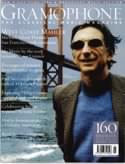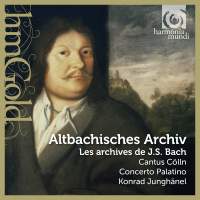Texte paru dans: / Appeared in:
|
|
| " ... a set that can be warmly recommended" | |
|
Reviewer: Stanley
Sadie Alt-Bachisches Archiv is the name given to a collection of music by the older members of the family that is, preceding JS Bach's generation - which JS and later CPE carefully preserved, annotated and catalogued. It forms a principal source for the older Bachs' works. Among those older Bachs, the pre-eminent composer is certainly Johann Christoph (1642-1703), a cousin of JS Bach's father and for many years organist of Eisenach, 'as good,' JS wrote, 'at inventing beautiful ideas as he was at expressing words'. Music by Johann Christoph, not surprisingly, occupies almost two-thirds of this new issue. Chiefly it is motets and what he called concertos and we call cantatas, and there are also some arias, simple hymn-like pieces for four voices. The motets, for choir and continuo, are short works, but JC seems able to create a very distinctive sound-world and a strong atmosphere even within a three- or four-minute piece. Try the funeral motet Der Gerechte, with its sombre opening, full of symbolic descending figures (dealing with the death of the righteous), giving way to optimistic, energetic counterpoint in the faster music that follows; or, among the double-choir motets, Lieber Herr Gott, with its constant shifting echoes from one to the other and its closely worked fugal ending, or Herr,nun lässest, with its surprising and ingenious key changes.
The biggest piece here, however, is the wedding cantata Meine Freundin, du bist schön, mostly to words from the Song of Solomon; Johann Ambrosius Bach (JS's father) left a very candid written commentary, probably originally from the composer, which makes it clear that the erotic text is intended to be understood literally, not as religious symbolism, and indeed the music mirrors it happily with its elaborate lines, its soft and warm texrures (four violins, three violas) and the intertwining of voices or voice and violin. Central to it is an extended and ingenious chaconne; later there is declamatory music and a final celebration with busy violin writing. This fine and attractive piece, not previously available on CD, ought to be better known.
There are also more conventional cantatas, one of them, Es erhub sichh ein Streit (once performed by JS, and admired by CPE), with two five-part choirs and a battery of brass, using antiphonal techniques and sumpruous textures to highly dramatic effect in the story of the triumph of St Michael and his angels over the forces of darkness. Another, Die Furcht des Herren (the notes suggest that this may acrually be by Johann Christoph's younger brother, Johann Michael), with much interplay between soloist and choir, represents a city chamberlain and other functionaries praying for help from Wisdom (a soprano); Herr, wende dich, also cast in dialogue style, has much impassioned music. Still more so the Lamento Wie bist du denn, a beautifully written piece for bass with soft accompanying violas da gamba; the agitated violin figures represent the sinner's sufferings and the piece ends with ardent pleas for mercy and ultimate hope. Another Lamento, Ach, dass ich Wassers gnug hätte, sometimes ascribed to Johann Christoph's father, Heinrich, is firmly placed by modern Bach scholarship among the son's works: whoever wrote it, this dramatic recitation for countertenor with solo violin and strings is a piece of uncommon intensity.
The arias are relatively uninteresting, brief hymn-like pieces for four voices and continuo, in several verses to the same music (sometimes harmonically varied). Pieces of this kind by Johann Michael (1648-94) are included too; one of them, Auf, lam U1lS, has a richly improvisatory and expressive violin solo. There are also four of his motets, among which I found Nun hab' ich, with its antiphonal first part (including some telling harmonic writing) giving way to a kind of chorale-prelude texture, particularly appealing.
These two brothers' uncle, Johann (1604-73), organist in Erfurt, is composer of one motet, Unser Leben ist ein Schatten, with some remarkable word-painting, for a six-voice choir and an echo choir of three voices, providing some curious effects; the authorship of the other items ascribed to him, which included an attractive, old-style motet for two choirs, high and low, however is dubious. I should mention the cantata by Georg Christoph (1642-97), organist in Schweinfurt - a cousin ofJohann Christoph and Johann Michael and older brother to JS Bach's father. In 1689 Georg and his two brothers (Bach's father was a twin) had a reunion on his birthday and to celebrate the occasion he wrote this spirited cantata, in which almost everything hinges on the number 3 (clearly he had the numbers gene that also went to his nephew). This, Sieh, wie fein, is among the most enjoyable pieces here. Lastly, there is lch lasse dich nicht by JSB himself: this, long ascribed to Johann Christoph, has lately been restored to the canon and is believed to have been written as a funeral motet in 1713. Certainly the confident use of a more modern contrapuntal style seems to betray his hand.
Cantus Cölln and their
collaborators serve the music admirably. There is shapely and carefully
modulated choral singing, with much refined detail, and clearly enunciated solos
- the countertenor one is done with particular intensity, as the music demands,
but there is some impassioned singing, too, from the sopranos and basses: I
won't single out any by name as the standard throughout is so high. No less
impressive is the string playing - the solo violinist (whom I take to be Ursula
Bundies) is especially successful at conveying the passion that lies behind this
music without violating its restrained style. Some listeners may feel that they
could have done without the multi-verse hymns, but they do help give a rounded
picture of the composers' vocal output. Clear and nicely balanced recordings:
altogether a set that can be warmly recommended. |
|
|
|
|
|
Cliquez l'un ou l'autre
bouton pour découvrir bien d'autres critiques de CD |
|




